The Olympian 12 The most well-known gods and goddesses in Greek mythology and possibly all mythology are the Olympians, a council of 12 that ruled the universe from Mount Olympus. So, who are they? Note that many of Greece's mythologies conflicted one another, so what you learn elsewhere might differ. Aphrodite: Aphrodite was the goddess of beauty and love. She protected sailors at sea. A myth says she and Eros escaped the giant Typhon by transforming into fishes, and then was honored in the skies with the constellation Pisces. Ares: Ares was the god of war, not to be confused with Aries the ram. He was a very cruel god, and not even his parents, Zeus and Hera, liked him. Artemis: Artemis was the goddess of the hunt, and the protector of mothers. She loved any animal, no matter how wild. Some accounts associate her with the moon. She also had a chariot, driven by the Elaphoi Khrysokeroi, or golden-horned deer. Apollo: Apollo was the god of music and healing. Some accounts associate him with the sun. His twin sister was Artemis. Athena: Athena was the goddess of wisdom, and was said to help brave heroes like Hercules. She jumped from Zeus's head, fully grown, instead of being born. Zeus had swallowed Athena's mother, Metis, to protect them both from Hera's wrath. Demeter: Demeter was the goddess of the harvest. Her daughter was Persephone. Dionysus: Dionysus was the god of wine. Hera: Hera was the goddess of marriage, and the wife of Zeus as well as his sister. She had placed the eyes of her favorite bodyguard, Argus, in a peacock's feathers after he had been killed by Hermes. She is the queen of Olympus. Hermes: Hermes was the messenger of the gods. He was also a very talented trickster. Hephaestus: Hephaestus was the god of fire and the forges where tools and weapons were made. He was the blacksmith of the gods; forging all their weapons. Poseidon: Poseidon was the god of the sea. His brothers were Zeus and Hades. He also ruled over destructive earthquakes and horses. When the Olympians overthrew Cronos, Cronos's three sons divided the world among themselves. Zeus got the sky, Poseidon got the sea, and Hades ended up with the underworld. Zeus: Zeus was the god of the sky and storms. He ascended to his rule over Olympus after he overthrew his father, Cronos the Titan. When he and the Olympians overthrew Cronos, Cronos's three sons divided the world among themselves. Zeus got the sky, Poseidon got the sea, and Hades ended up with the underworld. Other gods and goddesses There were many more gods and goddesses than the Olympians. There were minor gods, as well as the Titans, the parents of half of the Olympians. The most well-known and important of them are.... Eris: Eris was the goddess of discord (conflicts and disharmony). She is most famous for inadvertently starting the Trojan War. She was not invited to the wedding of Pelius and Thetis. She (being a goddess) was outraged; she had expected to be invited. She stormed into the wedding and threw down a beautiful golden apple, then stormed back out. The apple was meant to go "to the fairest". Athena, Hera, and Aphrodite all reached for the apple at the same time. Zeus decided that a judge was needed, and the chosen judge was Paris, the prince of Troy. Each goddess offered the prince a wonderful gift. Athena offered him wealth, Hera offered him power, and Aphrodite offered him an incredibly beautiful woman as his wife. Paris accepted Aphrodite's offer, and Paris set of to retrieve his promised bride. The bride in question was Helen, the wife of Melanus, called the most beautiful woman in the world. Myths disagree on whether Helen came willingly or not, but either way, Melanus started the Trojan War in a bid to get Helen back. Amazingly enough, this myth found its way into Egyptian mythology, though in a very different form, as told on egyptianmyths.com. Go to http://www.egyptianmyths.net/section-myths.htm, and then click on The Greek Princess. Eros: Eros was Aphrodite's companion and the god of romance. Many accounts also call him Aphrodite’s son. He was pictured as a young man with wings and a bow-and-arrow that could make people fall in love. He was probably the origin of the Cupid we all know. In fact, Eros was known as Cupid in Rome. Hades: Hades was the god of the underworld (Which was also referred to as Hades.) who presided over the dead. His brothers were Zeus and Poseidon, and his wife was Persephone. When the Olympians overthrew Cronos, Cronos's three sons divided the world among themselves. Zeus got the sky, Poseidon got the sea, and Hades ended up with the underworld. Hebe: Hebe was the goddess of youth. She was an attendant of Aphrodite and became Hercules's wife when Hercules became immortal. Hekatonkheires: The Hekatonkheires were three gods who controlled violent storms. They each had 50 heads and 100 arms, and they were relatives to the Cyclopes. They were Ouranos's children, making them at least part Titan. However, Ouranos bound them all in Tartarus (in the darkest part of the underworld, reserved for the most powerful, and usually evil), as he was afraid of the Hekatonkheires's powers. Later, Zeus freed them all and the Hekatonkheires would fight for Zeus in the war against the Titans. Hesperides: The Hesperides were three nymph sisters, and the goddesses of the sunset. They were the guardians of Hera and Zeus's tree of golden apples. Their godly parent was either Nyx or Atlas. Hestia: Hestia was the goddess of the hearth, a large fireplace found in every house back then. She was a very peaceful goddess who rarely appears in myths. The Muses: The Muses were nine goddesses, the daughters of Zeus and Mnemosyne. Each of them presided over an art. Calliope was the muse of epic poetry. Cilo protected history. Erato ruled over love poetry. Euterpe was the goddess of music. Melpomene presided over tragedies, or sad plays and works. Polyhymna ruled over sacred poetry. Terpechore was the muse of dances, and Thalia of comedy. Urania (apparently named after her great-grandfather) was the goddess of astronomy. Nemesis: Nemesis was the goddess of revenge. She also was an Oceanide; a child of Oceanus. The word nemesis (rival) comes from her name. Nyx: Nyx is literally the night. Nyx is also the mother of the Fates, Aither (light), and Hemera (day), as well as Hypnos (sleep) and many dark spirits. Persephone: Persephone was the goddess of fertility. A long time back, she was kidnapped by Hades, who held her captive in the Underworld. Her mother, Demeter, convinced the gods to let Persephone return to the earth. However, Persephone had eaten a pomegranate, so she was bound to the underworld. Persephone had to stay with Hades in the Underworld as his queen for 4 months (some versions say 6, though) and for the rest of the year she could live with her mother. When Persephone had to return to the Underworld each year, it upset Demeter so much she wouldn't help any plants bloom. The Greeks used this myth to explain the seasons. During the winter Persephone would live in the Underworld, and spring and the blooming of plants marked her return to her mother.
| 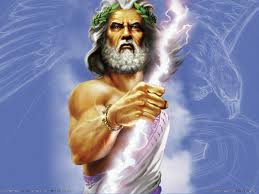 Above: Zeus Below:Poseidon 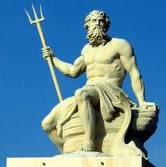 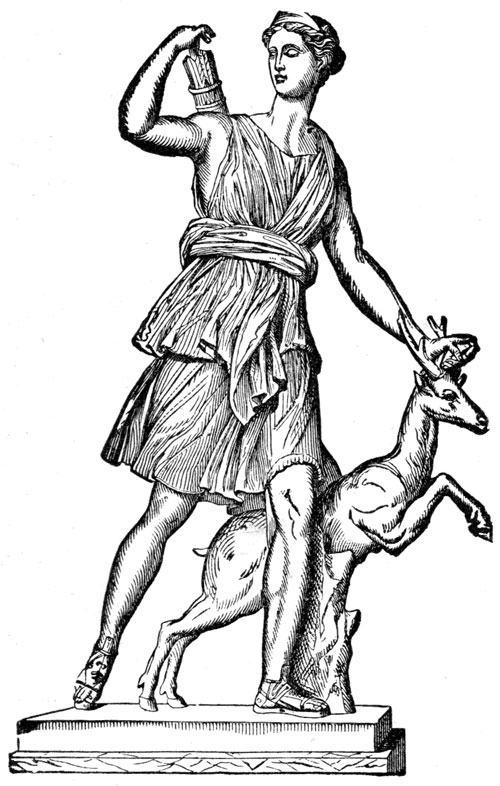 Above: Artemis Below: Demeter 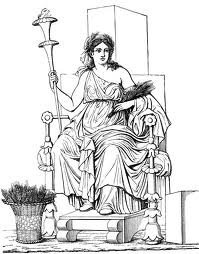 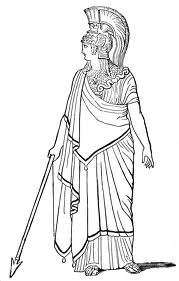 Above: Athena Below: Hephaestus 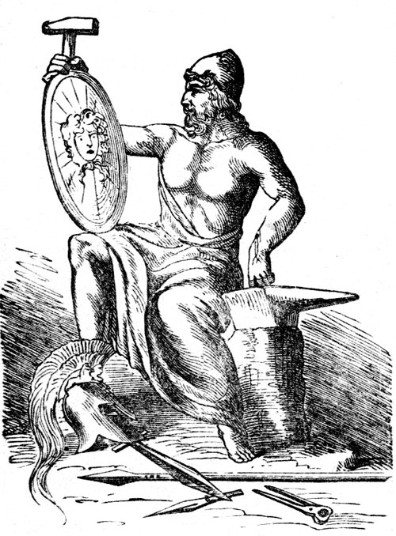 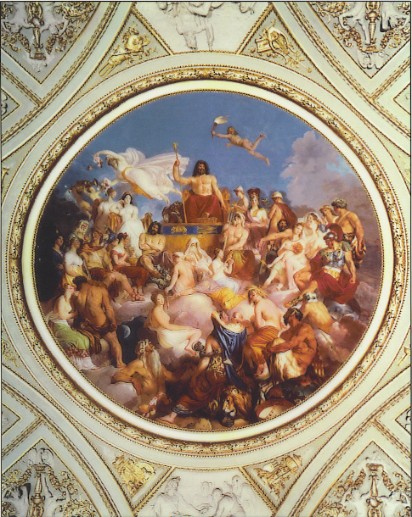 Above: Many Olympians, and other gods and goddesses, on Olympus. Below: One of the Muses 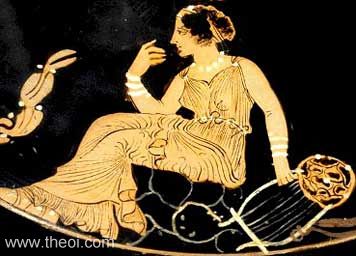 |